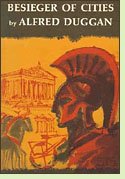Besieger of Cities
(also titled Elephants and Castles)
by Alfred Duggan
Reviewed by David Maclaine

Besieger of Cities is set in the Greek world after Alexander's empire has fractured into five major parts, with the kings of the new realms scheming to enlarge their own domains and perhaps, with ambition, luck and skill, to reunite the empire once again. The protagonist of the novel is Demetrius, son of Antigonus, an adventurer who early in the story brings "liberty" to the cities of the Greek homeland. His bemused response when the grateful Athenians declare him a god is the first of many events revealing Demetrius' skeptical but good-natured personality and leavening the novel with humor. His attempts to sort through the contradictions of Athenian democracy add to the enjoyment, and the comedy multiplies when the distinctly heterosexual protagonist tries to adopt the fashions of his hosts by seeking a young male lover. Demetrius is a bit more successful in his multiple marriages, remaining on good terms with the companionable first wife who deals patiently with the additional spouses he must add for political purposes. His military career has its ups and downs. He was more famous for the latter; his greatest failure as a besieger of cities was commemorated by the Colossus of Rhodes.
Reading Besieger of Cities gives one a nice central view of the various powers that arose in Alexander's divided empire, from the standpoint of one player who finds that the varying fortunes of the warlord's trade eventually have a downward trend. Alfred Duggan's great gift was his Dickensian ability to create characters who are both believable and likeable. Demetrius has the good humor of Mr. Pickwick and the unfounded hopefulness of Mr. Micawber; it seems only proper that the Besieger's adventures end in comfortable house arrest rather than a violent death. Nice guys may finish last, but at least they don't always end up as mincemeat. (1963, 287 pages)
More about Besieger of Cities at Powell's Books, Amazon.comBesieger of Cities appears on the list of The 36 Best Historical Novels for a Survey of Ancient Greek History
Other novels about the struggles for power after Alexander's death:
Funeral Games by Christian Cameron (2010), about the brother-sister twins, heirs to a rich Black Sea kingdom, who become fugitives after their mother is killed and must journey west to take shelter with their father's old friend Diodorus, himself in the midst of a violent struggle for power after the death of Alexander the Great; #3 in the Tyrant series. See review or more info at Powell's Books
Funeral Games by Mary Renault (1981), about the fracturing of Alexander's empire after his death as his generals and relatives vie for power. See review or more info at Powell's Books
Stealing Fire by Jo Graham (2010), historical fantasy about Lydias of Miletus, who follows Ptolemy to Egypt after Alexander's death. More info
Nonfiction about the fracturing of Alexander's empire:
Dividing the Spoils: The War for Alexander the Great's Empire by Robin Waterfield (2011). More info
The Greek World after Alexander: 323-30 B.C. by Graham Shipley (2000). More info
The Hellenistic World by F.W. Walbank (1992). More info
Online:
Plutarch's "Life of Demetrius" at www.Attalus.org
Back to Novels of Ancient History
Back to Directory of Book Reviews